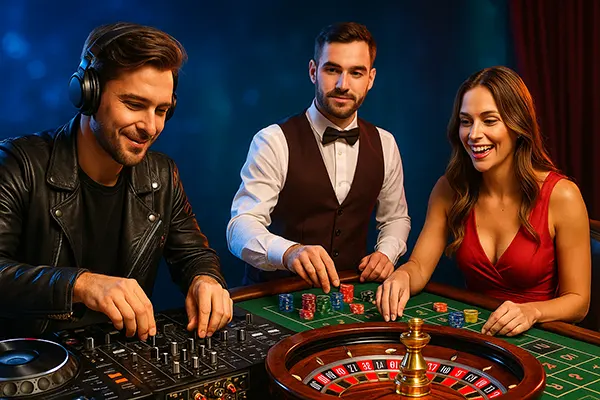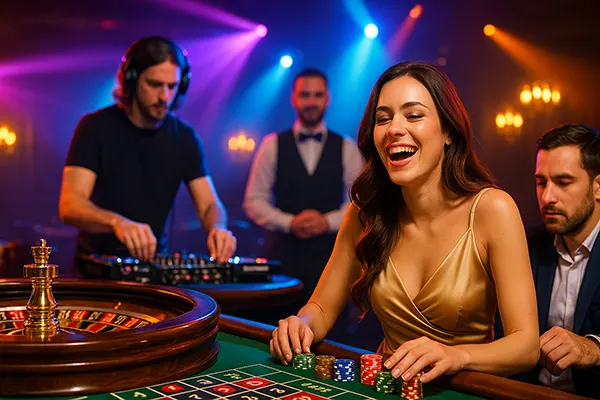Emotional Triggers in Live Casino Sound Design: From DJ Sets to Real-Time Bets

Sound and music have become integral to the atmosphere of modern live casinos. They create emotional depth, influence player behaviour, and enhance engagement during real-time gaming sessions. The combination of tempo, rhythm, and well-crafted sound cues transforms each betting moment into an immersive auditory experience. Understanding how these elements function is crucial for analysing how sound impacts decision-making during play.
The Psychology Behind Sound in Live Casinos
Music in live casinos is not chosen randomly — it is designed to influence the player’s state of mind. Studies in cognitive psychology confirm that rhythm and tone can affect arousal levels, making players more attentive and responsive to game events. High-tempo tracks can increase excitement, while slower, ambient compositions encourage longer play sessions by reducing stress and fatigue.
In 2025, live casinos increasingly rely on professional sound engineers who apply psychological research when selecting soundscapes. These specialists fine-tune the frequency balance and dynamic range to evoke a sense of anticipation during spins and deal sequences. This careful sound calibration ensures that every audio cue aligns with the player’s emotions at each stage of the game.
Sound also serves a communicative purpose. Winning melodies, coin jingles, or celebratory tones stimulate the brain’s reward system, reinforcing a sense of success. Conversely, subtle minor chords after a loss are designed not to frustrate but to maintain engagement — a method now widely discussed in behavioural economics applied to digital entertainment.
How DJ Sets Reinvent the Live Casino Experience
One of the major trends in 2025 is the integration of live DJ performances within online casino broadcasts. Platforms like Evolution and Pragmatic Play Live collaborate with professional DJs to create adaptive soundtracks that evolve with the pace of the game. This live element enhances realism, connecting digital players to the energy of a physical casino floor.
DJ sets are typically structured to follow the emotional curve of gameplay. When the betting round begins, the tempo rises, encouraging quick reactions and decision-making. As the round closes, smoother transitions or deep bass patterns stabilise the atmosphere, providing players a momentary sense of control before the next bet.
Sound designers highlight that real-time mixing allows for emotional synchronisation between the audience and the host. According to audio director Martin Löfgren, who collaborated with several European live casino studios, “a well-timed drop or beat switch can build tension stronger than any visual effect.”
Sound Design Elements That Shape Player Emotions
Several acoustic components determine how sound affects player behaviour. The tempo dictates the rhythm of decision-making: faster beats push for more dynamic gameplay, while slower tempos encourage cautious strategies. Tonality and harmony define the emotional undertone — major keys foster optimism, while minor keys invoke suspense.
Silence plays a surprisingly powerful role in the emotional architecture of live games. Short pauses between spins or after a dramatic loss allow the player’s brain to process the event, heightening the impact of subsequent sounds. This use of silence creates rhythm and contrast, reinforcing emotional peaks.
Finally, volume automation and stereo effects are often used to create spatial realism. A rising sound from left to right can simulate motion across the table, while subtle reverberation mimics the acoustics of a real casino hall. These details, though almost imperceptible, play a key role in sustaining attention and engagement.
Interviews and Insights from Sound Engineers
According to Danish audio producer Sofie Nørgaard, live casino sound design is “a fusion of gaming psychology and music production.” Her team crafts layered soundtracks that combine electronic beats with ambient textures to match both the game’s rhythm and player emotions. The aim is not just entertainment — it’s behavioural guidance through sound.
Another sound engineer, Lucas Moreno from Pragmatic Live Studio in Malta, explains that player engagement metrics are often analysed alongside audio patterns. “We monitor how players respond to specific sounds — for instance, whether a higher pitch at a win prompt increases betting speed or if softer tones retain attention longer.”
These insights are used to refine future sound mixes, creating a data-driven approach to emotional influence. Yet, professionals in the field emphasise maintaining transparency and ethical integrity in how sound is used to influence user behaviour.

Ethical Considerations in Auditory Influence
While music can enhance enjoyment, it also raises ethical concerns about manipulation. Experts warn that excessive use of rewarding sound cues may encourage impulsive betting or prolong play beyond safe limits. The line between engagement and exploitation becomes thin when sound directly affects psychological responses.
Responsible studios now adopt ethical frameworks for sound use. They limit the intensity of “victory” sounds, diversify background music, and include moments of neutral ambience to balance emotional impact. Some even introduce optional sound settings, allowing players to control or mute audio triggers based on comfort levels.
In 2025, regulatory bodies such as the UK Gambling Commission and MGA have begun assessing sound design as part of responsible gaming standards. Developers are now expected to document how auditory elements contribute to fairness, emotional stability, and player well-being during live sessions.
The Future of Sound in Live Casino Experiences
As technology advances, adaptive AI-driven sound systems are emerging. These tools analyse player activity in real time and adjust sound parameters to maintain optimal engagement without crossing ethical boundaries. The result is a personalised experience where music adapts organically to each session.
Virtual and augmented reality casinos are also redefining the soundscape. In 3D environments, spatial audio enhances immersion, allowing players to perceive distance, movement, and direction just as they would in a physical venue. This level of realism not only improves enjoyment but also supports responsible sensory balance.
The future of live casino sound design lies in harmonising entertainment with ethics. Music will remain a powerful emotional trigger, but its application must prioritise player safety, awareness, and respect for human psychology — turning sound from a manipulative tool into an art of balance.
